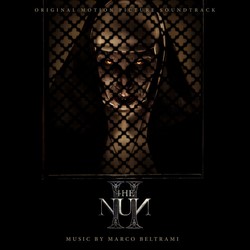Master of Nun
From screaming at a nun to soaring over Norwegian mountains. There’s surely something for everyone to enjoy from recent soundtrack releases.
I get it. Fans felt disappointed when it became clear that Abel Korzeniowski, having scored The Nun, was not returning for its sequel The Nun 2, but…
It’s Marco Beltrami who’s stepped up to the altar and who’s skilfully flailing his musical nunchucks at us. Whilst Beltrami doesn’t re-use any of Korzeniowski’s material, he does follow up with similar material and his own themes. This is good news, because, just like the first Nun, the second Nun is a fully fledged orchestral score including choir. We know Beltrami excels at this kind of material from his previous scores for Mimic, the Scream trilogy, The Omen remake and various other horror-films. Beltrami uses choir to sometimes create a false sense of innocence; other times to create a liturgical atmosphere; and elsewhere to scare the pants of you. It’s a big orchestral work, proper epic at times with big brass and strings, the likes of which we don’t often hear these days. But there are also quieter, introspective cues, which inject the score with drama and emotion, elevating the whole thing far above most horror scores. Korzeniowski of course did the same. Where The Nun 2 differs mostly from Korzeniowski’s original is that it’s less experimental or atonal. There’s a fair bit of dissonance; and all the usual horror tropes are here, but I believe Korzeniowski pushed it considerably further out of our comfort zones than Beltrami does. Nuntheless, Beltrami’s The Nun 2 is an excellent horror score with plenty of scares and unnerving moments skilfully balanced against some truly beautiful introspective cues. (20 tracks, 56 min.)
I should really pay more attention to details. When I started listening to Mark Mothersbaugh Disney’s Halloweentown I was struck by how ‘fake’ it sounded. Not even sampled, worse than that. It sounds like 90s romplers (sample based keyboards), it sounds dry and I swear I can hear notes cutting off as the machines seem to max out their polyphony. I was sat here wondering why anyone would deliberately sound like this today? Then I discovered that this is a score from 1998 and suddenly it all made sense. I can move on now. Ignoring the old-style synth sounds, the score is good fun. It’s got a catchy main theme, almost Elfman-like with it’s oompa-oompa rhythm; and it’s melodic and colourfully arranged all the way through. I’m not likely to return to this score ever again though, because I’m allergic to this level of excessive playfulness and happiness, but you know, it’s a fun score…a bit zany, quirky, typical kids TV kinda score. (24 tracks, 42 min.)
Songs of Earth by Rebekka Karijord is a minimal, string-driven, atmospheric work. It relies heavily on slow motions and textures, rather than any recognisable motifs. Karijord mixes sounds of nature, wind and water for example, into the music, creating quite a meditative work. The sparse arrangements, which occasionally also include choir, do sound very Scandinavian (unsurprisingly as Karijord is Norwegian-born, Sweden-based) and also feel a bit cold. And this is completely to be expected as Songs of Earth accompanies a documentary showcasing Norway’s gorgeous landscapes and mountains. Fans of composers like Johann Johannsson will likely find something to appreciate here. There are times I’m very much in the mood for this kind of aural experience, and there are times I’m too impatient for it. It’s does require you to surrender yourself to the music for forty-five minutes. And though it is minimal, I think the added organic sound effects actually help the music tell a story. If you’re blessed with a good memory, you may recognise Karijord’s name from I am Greta, which she worked on alongside Jon Esktrand. Songs of Earth is possibly a bit of an acquired taste, more atmospheric and textural than melodic, more meditative than actively engaging. I quire like it, but it’s not for every day. (15 tracks, 45 min.)
Staying with minimal works, Under the Waves by Nicolas Bredin is also a slow moving atmospheric work. Unfairly compared to Songs of Earth (just because I happened to listen to them back to back) I’d say that Under the Waves is darker and more oppressing and less organic, as it relies largely on synth pads juxtaposed with piano and vaguely sparkly synth sounds. A few cues are livened up with guitar and percussion, but the overall mood remains subdued and melancholy. It has nice moments, but at nearly eighty minutes, it’s overstaying its welcome, for me at least. (21 tracks, 78min.)
Article by Pete Simons (c) 2023 Synchrotones





